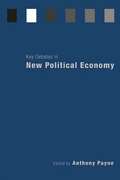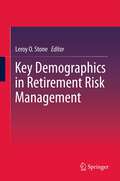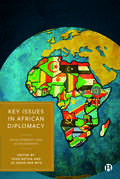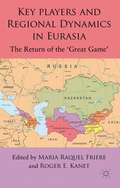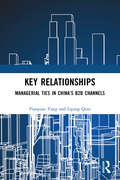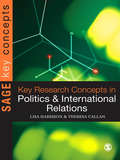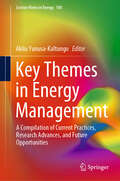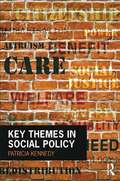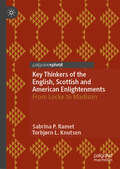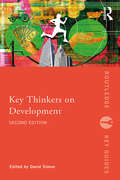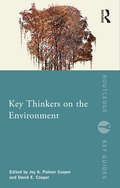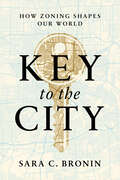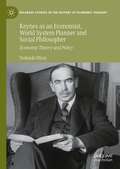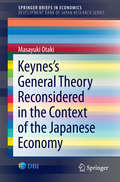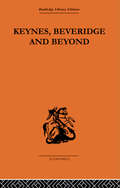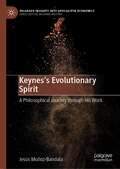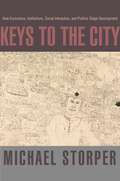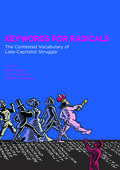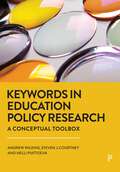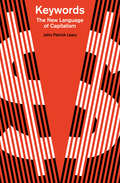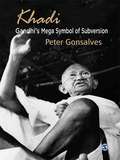- Table View
- List View
Key Debates in New Political Economy
by Anthony PayneA concise and highly informative overview of the major intellectual debates within the field of political economy over the last decade. Each chapter provides a review of a key area written by a distinguished expert in the field. A comprehensive introduction locates these debates within the wider intellectual and political context which gave rise to them and provides some pointers to the future directions of political economy. Key areas covered include: models of capitalism globalization the environment gender territory and space regionalism development. This is essential reading for all students of political economy from distinguished contributors including: Anthony Payne, Colin Crouch, James Meadowcroft, V. Spike Peterson, Saskia Sassen, Björn Hettne and Adrian Leftwich.
Key Demographics in Retirement Risk Management
by Leroy O StoneKey Demographics in Retirement Risk Management argues that the weakening of public and employer-sponsored social safety nets in several countries will permanently increase pre-retirees' risk-anxiety and create pressure towards readjustment of their expectations about the quality of their lives in retirement. The result will be to raise the priority of achieving effective comprehensive retirement related risk management. This achievement requires an emphasis upon the cascading of linked risks, and careful attention to the optimization of scarce resources used to manage those linked risks. Professional financial and retirement planning advisors comprise a key source of help. This book develops new knowledge concerning the factors that help to explain three important aspects of access to these professional advisors. The results of this analysis are used to illustrate the process of identifying distinctive population segments, key demographics, on the basis of multiple population attributes treated simultaneously. The illustration is further extended with an identification of distinctive population segments relative to performance on a composite indicator of the conduct of multiple retirement risk management activities. The book also discusses implications of the pattern of gender differences in preparedness to address retirement's challenges, highlighting subgroups of women in which inadequate preparedness is pronounced.
Key Issues in African Diplomacy: Developments and Achievements
by Sven Botha and Jo-Ansie van WykAfrica’s unique position as an international diplomatic actor has not always been given the attention it deserves. This volume bridges this gap by offering a fresh, comprehensive and realistic overview of African diplomacy. The book examines African diplomatic practice. Chapters explore how different types of diplomacy have developed over time, including energy diplomacy, economic diplomacy and quiet diplomacy. Crucially, the book assesses how certain events have allowed Africa to use certain types of diplomacy to yield better outcomes for itself. Including contributions from an international team of scholars, policy makers and experts from the diplomatic world, the book provides a comprehensive guide to African diplomacy and challenges the current dominant usage of Northern perspectives on diplomacy studies.
Key Players and Regional Dynamics in Eurasia
by Maria Raquel Freire Roger E. KanetExplores Russia's re-emergence as a major actor in Central Asia and the Caucasus - a re-emergence which is limited by the involvement and influence of external state and non-state actors, including China, the USA and foreign energy companies.
Key Relationships: Managerial Ties in China’s B2B Channels
by Pianpian Yang Liping QianThis book explores the governance and ramifications of managerial ties in China’s B2B contexts, with the aim of uncovering theoretical mechanisms and practical strategies for effective management of these relationships.In this book, managerial ties refer to personal relationships between corporate executives, business partners, and government or regulatory officials. While common in the Chinese business environment, these relationships are gaining recognition and value globally. Drawing on insights from four empirical studies, the authors focus on managerial ties within channel relationships among Chinese firms. The book analyzes how business and political ties affect channel outcomes, highlights the limitations of managerial ties in emerging markets, and identifies conditions or mechanisms that may lead to negative effects.This work will be valuable to researchers and students of business management and relationship marketing, as well as to business professionals interested in Chinese business practices and multinational companies operating in China.
Key Research Concepts in Politics and International Relations
by Lisa Harrison Theresa CallanFrom action research to validity, this innovative and informative text is an invaluable guide to a variety of core research concepts in both political science and international relations. Key Features: - Each entry is consistently structured, providing: a clear definition, a focused explanation, a summary of current debates and areas of research, further reading, and references to other related concepts. - Explains how and why particular research methods are used and highlights alternative research concepts and strategies. - Cross-relates entries, enabling you to dip in to topics and follow threads throughout the book. - Packed with illuminating examples to help you to apply theory to the ′real world′ of political analysis. An essential companion for students of Politics and International Relations at both undergraduate and postgraduate levels.
Key Themes in Ancient History: Politics in the Roman Republic
by Henrik MouritsenThe politics of the Roman Republic has in recent decades been the subject of intense debate, covering issues such as the degree of democracy and popular influence, 'parties' and ideology, politics as public ritual, and the character of Rome's political culture. This engaging book examines all these issues afresh, and presents an original synthesis of Rome's political institutions and practices. It begins by explaining the development of the Roman constitution over time before turning to the practical functioning of the Republic, focusing particularly on the role of the populus Romanus and the way its powers were expressed in the popular assemblies. Henrik Mouritsen concludes by exploring continuity and change in Roman politics as well as the process by which the republican system was eventually replaced by monarchy. This original and readable book will be important for all students and scholars of Roman history and of politics in general.
Key Themes in Energy Management: A Compilation of Current Practices, Research Advances, and Future Opportunities (Lecture Notes in Energy #100)
by Akilu Yunusa-KaltungoThis book provides a comprehensive global coverage of energy management as it relates mostly to developing countries. In an era of unprecedented global population growth, the demand for energy has reached staggering levels. The United Nations reported an enormous 200% increase in population between 1950 and 2020, with projections indicating a further rise to 10.9 billion by 2100. As a direct consequence, global primary energy usage has surged from 3701 Mtoe in 1965 to 13511 Mtoe in 2017, putting immense strain on existing energy sources. If current growth rates persist, these sources could be depleted within a mere 130 years. To address this impending crisis, governments worldwide have implemented regulations and incentives to promote energy conservation. While numerous studies and publications have emerged within the field of energy management, there remains a significant research gap, particularly concerning the energy challenges faced by developing countries. Existing edited books on energy-related topics often narrowly focus on specific aspects, hindering readers from gaining a holistic understanding of energy management challenges and potential solutions. This book fills this void. Recognizing the pivotal role these nations play in achieving sustainable development goals, this book provides a wide-ranging perspective on the trends, challenges, and potential solutions to energy crises in these regions. It not only acknowledges the challenges faced by developing countries but also offers viable strategies to address them. The editor, leveraging his successful leadership experience in global academic endeavors, including publishing a book on Occupational Safety & Health practices during the COVID-19 era and coordination of multinational research projects, is well positioned to bring together exceptional chapters from various countries. His extensive network ensures the inclusion of diverse perspectives, enriching the book's content and offering invaluable insights to readers. Designed for a broad readership, including energy industry organizations, professionals, researchers, government bodies, policymakers, and students, this book delves into a wide array of energy management issues. By facilitating a comprehensive understanding of the subject, it equips readers with the knowledge and tools necessary to navigate the complex landscape of energy management in the modern world.
Key Themes in Social Policy
by Patricia KennedyKey Themes in Social Policy provides an accessible and authoritative introduction to the key concepts used in social policy, from autonomy to wellbeing. With over 100 ideas discussed, this is a comprehensive student guide and is designed to help readers to gain a deeper understanding of major debates and issues. Each entry: explains the origin of the word discusses its relationship to the social sciences describes its relevance to social policy and how widespread its use is outlines some of the key thinkers and research on the topic and gives suggestions for further reading. Making it easy to understand and use the most important ideas in the area, this is an essential companion for all students taking social policy courses.
Key Thinkers of the English, Scottish and American Enlightenments: From Locke to Madison
by Sabrina P. Ramet Torbjørn L. KnutsenThis book summarizes and explains the way in which political thinkers in England, Scotland, and North America reshaped Western thinking about government and citizens. Although the ideas of the Anglo-American Enlightenment can be traced back, in embryo, to the Italian Renaissance and the Protestant Reformation, it was responses to wars – the Thirty Years’ War (1618-1648) and the English Civil War (1642-1651) which were fought above all over religion – that defined it. Algernon Sidney demanded an end to royal absolutism. John Locke called for a government based on religious toleration. Benedictus de Spinoza, Samuel von Pufendorf and others elaborated on the ideas that society was composed of sovereign individuals endowed with reason and rights. Building on the works of these thinkers, Scottish philosophers including David Hume and Adam Smith, and American revolutionaries including Thomas Jefferson and James Madison advanced arguments defending human reason, individual freedom, including religious freedom, and democracy.
Key Thinkers on Development (Routledge Key Guides)
by David SimonSince its publication in 2006 as Fifty Key Thinkers on Development, this invaluable reference has established itself as the leading biographical handbook in its field, providing a concise and accessible introduction to the lives and key contributions of development thinkers from across the ideological and disciplinary spectrum. This substantially expanded and fully updated second edition in the relaunched series without the numerical constraint includes an additional 24 essays, filling in many gaps in the original selection, greatly improving the gender balance and diversifying coverage to reflect the evolving landscape of development in theory, policy and practice. It presents a unique guide to the lives, ideas and practices of leading contributors to the contested terrain of development studies and development policy and practice. Its thoughtful essays reflect the diversity of development in theory, policy and practice across time, space, disciplines and communities of practice. Accordingly, it challenges Western-centrism, Orientalism and the like, while also demonstrating the enduring appeal of "development" in different guises. David Simon has assembled a highly authoritative team of contributors from different backgrounds, regional settings and disciplines to reflect on the lives and contributions of leading authorities on development from around the world. These include: Modernisers like Kindleberger, Perroux and Rostow Dependencistas such as Frank, Furtado, Cardoso and Amin Progressives and critical modernists like Hirschman, Prebisch, Helleiner Sen, Streeten and Wang Political leaders enunciating radical alternative visions of development, such as Mao, Nkrumah and Nyerere Progenitors of religiously or spiritually inspired development, such as Gandhi, Ariyaratne and Vivekananda Development–environment thinkers like Agarwal, Blaikie, Brookfield, Ostrom and Sachs International institution builders like Singer, Hammarsköld, Kaul and Ul Haq Anti- and post-development thinkers and activists like Escobar, Ghosh, Quijano and Roy Key Thinkers on Development is therefore the essential handbook on the world’s most influential development thinkers and an invaluable guide for students of development and sustainability, policy-makers and practitioners seeking an accessible overview of this diverse field and its leading voices.
Key Thinkers on the Environment (Routledge Key Guides)
by David E. Cooper Joy A. Palmer CooperKey Thinkers on the Environment is a unique guide to environmental thinking through the ages. Joy A. Palmer Cooper and David E. Cooper, themselves distinguished authors on environmental matters, have assembled a team of expert contributors to summarize and analyse the thinking of diverse and stimulating figures from around the world and from ancient times to the present day. Among those included are: philosophers such as Rousseau, Kant, Spinoza and Heidegger activists such as Chico Mendes and Wangari Maathai literary giants such as Virgil, Goethe and Wordsworth major religious and spiritual figures such as Buddha and St Francis of Assissi eminent scientists such as Darwin, Lovelock and E.O. Wilson. Lucid, scholarly and informative, the essays contained within this volume offer a fascinating overview of humankind’s view and understanding of the natural world.
Key Topics in Sociology: The Political Sociology of Human Rights
by Kate NashThe language of human rights is the most prominent 'people-centred' language of global justice today. This textbook looks at how human rights are constructed at local, national, international and transnational levels and considers commonalities and differences around the world. Through discussions of key debates in the interdisciplinary study of human rights, the book develops its themes by considering examples of human rights advocacy in international organisations, national states and local grassroots movements. Case studies relating to specific organisations and institutions illustrate how human rights are being used to address structural injustices: imperialist geopolitics, authoritarianism and corruption, inequalities created by 'freeing' markets, dangers faced by transnational migrants as a result of the securitization of borders, and violence against women.
Key to the City: How Zoning Shapes Our World
by Sara C. BroninAn eye-opening exploration of one of the little-known levers that controls our world—zoning codes—and a call-to-arms for using them to improve American society at every level. Zoning codes dictate how and where we can build housing, factories, restaurants, and parks. They limit how tall buildings can be and where trees can be planted. They have become the most significant regulatory power of local government, ultimately determining how we experience our cities. Yet zoning remains invisible. In Key to the City, legal scholar and architect Sara C. Bronin examines how zoning became such a prevailing force and reveals its impact—and its potential for good. Outdated zoning codes have maintained racial segregation, prioritized cars over people, and enabled great ecological harm. But, as Bronin argues, once we recognize the power of zoning, we can harness it to create the communities we desire, and deserve. Drawing on her own experience leading the overhaul of Hartford’s zoning code and exploring the efforts of activists and city planners across the country, Bronin shows how new codes are reshaping our cities—from Baltimore to Chicago, Las Vegas to Minneapolis, and beyond. In Boston, a law fought for by a passionate group of organizers, farmers, and beekeepers is transforming the city into a haven for urban farming. In Tucson, zoning codes are mitigating the impacts of climate change and drought-proofing neighborhoods in peril. In Delray Beach, Florida, a new code aims to capture and maintain the town’s colorful spirit through its architecture. With clarity and insight, Bronin demystifies the power of an inscrutable organizing force in our lives and invites us to see zoning as a revolutionary vehicle for change. In Key to the City, she puts forward a practical and energizing vision for how we can reimagine our communities.
Keynes as an Economist, World System Planner and Social Philosopher: Economic Theory and Policy (Palgrave Studies in the History of Economic Thought)
by Toshiaki HiraiThis book provides an insightful and original perspective on the work and legacy of John Maynard Keynes. It explores his work as an economist, world system planner, and social philosopher to highlight the different ways he influenced economics, economic policy, and the global political economy. Particularly attention is given to the development of the ideas which led up to The General Theory, his role as a planner and negotiator within international organizations, his work on the development of the post-war UK system, his debates with British Economists. This book examines the work and international legacy of one of economics’ defining thinkers. It will be of interest to students and researchers interested in the political economy and the history of economic thought.
Keynes on Uncertainty and Tragic Happiness: Complexity and Expectations (Palgrave Studies in the History of Economic Thought)
by Anna M. CarabelliMost economists who read the General Theory candidly admitted that they could not understand the theoretical apparatus and found it easy to recast it in traditional terms. This book provides a masterful guide to the generally unrecognized methodological revolution that supported the new theoretical concepts -- a veritable lodestone that complements and expands understanding on the treatment of the economic magnitudes appropriate to the ideal of generality in the social sciences, to the applicability of probability, to the formulation of decision-making under uncertainty, and the foundations of economic policy in interdependent economic systems. _Jan Kregel, Levy Economics InstituteAnna Carabelli sets out Keynes’s understanding of economics as a way of thinking, encompassing method and morals, rather than as a doctrine. She does so with her customary admirable scholarship and also her willingness to take controversial positions. I commend the volume most highly to Keynes scholars as a drawing-together and development of the themes that Carabelli has pursued since the publication of her 1988 classic, On Keynes’s Method. Further Keynes’s approach was designed to be applied to different contexts, so I enthusiastically recommend the volume also as a foundation and guide for anyone open to such a ‘new way of reasoning in economics’ for the modern era. _Sheila Dow, University of Stirling This book examines the philosophy and methodology of Keynes, highlighting its novelty and how it presented a new form of economic reasoning. Exploring Keynes’s use of non-demonstrative logic, based on probability, commonalities are found in his economics, ethics, aesthetics, and international relations. Insights are provided into his reasoning and his approach to uncertainty, rationality, measurability of complex magnitudes, moral and rational dilemmas, and irreducible conflicts.This book investigates methodological continuity within Keynes’s work, in particular in relation to uncertainty, complexity, incommensurability, happiness and openness. It will be relevant to students and researchers interested in Keynes, probability, ambiguity, ethics and the history of economic thought.
Keynes's General Theory Reconsidered in the Context of the Japanese Economy
by Masayuki OtakiThis book reconsiders Keynes's The General Theory of Employment, Interest and Money and establishes a new interpretation. In contrast to the existing models, this book finds that the stickiness in the nominal wage is not crucial for his theory. Moreover, the author has also succeeds in capturing the concept of liquidity in a rigorous mathematical model. In conjunction with the development of the concept of liquidity, the separation of the decision between savings and capital investment, which plays a key role in the principle of effective demand and denies Say's law, is exactly and originally formulated. The theory thus developed is applicable to elucidating some serious political economic causes that entrap the long-stagnated Japanese economy. For example, an analytical explanation is provided about why disinflation/deflation incessantly progresses despite the exorbitant expansionary monetary policy (ijigen kin-yuu seisaku) by the Bank of Japan. This phenomenon is an unsolvable question from the quantity-theoretic approaches (e. g. , monetarism and new Keynesianism) which, although they differ in assumptions concerning the length of adjustment periods, commonly assume that the price level sooner or later rises in proportion to the quantity of money. Owing much to Keynes, the author's approach considers that the price level is mainly governed by its marginal prime cost which is equal to the nominal wage as a first approximation. As such, the drastically sagging wages during the past 10 years provoke serious disinflation/deflation. It should be noted that this discussion never depends on the quantity of money.
Keynes, Beveridge and Beyond (Routledge Library Editions)
by John Williams Karel Williams Tony CutlerPresenting a coherent interpretation of the development of economic and social policy in Britain since 1945, this book analyses the political assumptions underlying post-war economic policy. It traces these assumptions through the classic texts of Keynes and Beveridge, the architects of limited, non-socialist state intervention to secure the welfare state and full employment. Topics covered include:* 'Private saving' versus company pensions* The level and composition of employment in Britain
Keynes’s Evolutionary Spirit: A Philosophical Journey through His Work (Palgrave Insights into Apocalypse Economics)
by Jesús Muñoz-BandalaThis book chronicles the way Keynes’s generous philosophy of practice evolved in consonance with the needs of his epoch. From a youngster reflecting on ethics and the classics, to becoming a leading voice in both wars in terms of political philosophy and international relations, to playing the role of innovator in both probability and economics, to taking a stance as an art appreciator, Keynes’s life and multidisciplinary contributions to humankind were permeated by his philosophical milieu. However, only a flexible, dynamic, and broad philosophy could have reflected and led the economic and political events in the world of the first part of the 20th Century, which is what Keynes managed to accomplish, and that is what the book suggests. This book captures the gist of Keynes’ evolutionary philosophy for our times. The book adds an evolutionary perspective to the existing literature on Keynes. As a case in point, the theoretical foundations of both macroeconomics and laissez faire are dissected. But the book also tells the story of how Keynes’s philosophy is adapted to a convulsed world, which is akin to ours, his legacy being gifted with multiple human considerations. The book offers an outline of Keynes’s philosophical stance—also compared with those of other European thinkers—at a moment when new ethical, epistemological, economic, and political perspectives are required, especially after the crisis of 2020. The conclusion is that Keynes´s theoretical and practical insights were far ahead of his time.
Keys to the City: How Economics, Institutions, Social Interaction, and Politics Shape Development
by Michael StorperWhy do some cities grow economically while others decline? Why do some show sustained economic performance while others cycle up and down? In Keys to the City, Michael Storper, one of the world's leading economic geographers, looks at why we should consider economic development issues within a regional context--at the level of the city-region--and why city economies develop unequally. Storper identifies four contexts that shape urban economic development: economic, institutional, innovational and interactional, and political. The book explores how these contexts operate and how they interact, leading to developmental success in some regions and failure in others. Demonstrating that the global economy is increasingly driven by its major cities, the keys to the city are the keys to global development. In his conclusion, Storper specifies eight rules of economic development targeted at policymakers. Keys to the City explains why economists, sociologists, and political scientists should take geography seriously.
Keystroke Capitalism: How Banks Create Money for the Few
by Aaron SahrWhy society needs to reclaim the power to create moneyAt the heart of capitalism lies the ability of private banks to create money at the stroke of a key. Why have we ignored this unique privilege for so long – and at what cost? Aaron Sahr attributes the lack of attention paid to money creation to the core of popular theories of capitalism, which equate economic power with capital ownership. This conceptual framework obscures the real drivers of capitalist dynamics as well as the causes of increasing inequality. By exploring the transformation of banking over the last half century, Sahr shows how the creation of money has driven the rise of finance as well as splitting incomes from wealth. As a result, the real economy of ordinary people has become a debt supplier to a monetary system whose returns accumulate at the top. It is not simply the markets but money itself that transfers wealth from the masses to a minority. Increasing financial inequality can therefore only be remedied by addressing predistribution – the modalities of money creation – as well as the distributive effects of the markets. By mapping this hidden regime of &‘keystroke capitalism&’, Sahr makes an essential contribution to our understanding of economic inequality and capitalist dynamics.
Keywords for Radicals: The Contested Vocabulary of Late-Capitalist Struggle
by A. K. Thompson Joy James Kelly Fritsch Clare O'Connor Silvia Federici"An extraordinary volume that provides nothing less than a detailed cognitive mapping of the terrain for everyone who wants to engage in radical politics. "—Slavoj Žižek, author of Living in the End Times "From its thought-provoking Introduction though its energizing accounts of the tensions underlying our most prized concepts, Keywords for Radicals will be indispensable to any scholar or activist who is serious about critique and change. "—Stephen Duncombe, editor of Cultural Resistance Reader In Keywords (1976), Raymond Williams devised a "vocabulary" that reflected the vast social transformations of the post-war period. He revealed how these transformations could be grasped by investigating changes in word usage and meaning. Keywords for Radicals—part homage, part development—asks: What vocabulary might illuminate the social transformations marking our own contested present? How do these words define the imaginary of today's radical left? With insights from dozens of scholars and troublemakers, Keywords for Radicals explores the words that shape our political landscape. Each entry highlights a term's contested variations, traces its evolving usage, and speculates about what its historical mutations can tell us. More than a glossary, this is a crucial study of the power of language and the social contradictions hidden within it. Contributors include Patrick Bond, Silvia Federici, John Bellamy Foster, Joy James, Ilan Pappé, Justin Podur, Nina Power, Mab Segrest, and more. Kelly Fritsch is a Banting Postdoctoral Fellow in Women's and Gender Studies at the University of Toronto. Clare O'Connor is a doctoral student in Communication at the University of Southern California. A. K. Thompson teaches social theory at Fordham University in New York.
Keywords in Education Policy Research: A Conceptual Toolbox
by Nelli Piattoeva Andrew Wilkins Steven J. CourtneyThe field of education policy research is a dense, crowded space owing to its complicated relationship to different intellectual histories and the influence of various ontologies or ‘turns’. To aid comprehension and clarity, this book describes the history, contribution and application of over 90 keywords in the field of education policy research. It is designed as a reference, learning and teaching tool to assist students, educators and researchers with: • complex learning and teaching; • wider and background reading and knowledge building; • critical scholarship and research; • interdisciplinary thinking and writing; and • theory development and application.
Keywords: The New Language of Capitalism
by John Patrick Leary&“A clever, even witty examination of the manipulation of language in these days of neoliberal or late stage capitalism&” (Counterpunch). From Silicon Valley to the White House, from kindergarten to college, and from the factory floor to the church pulpit, we are all called to be innovators and entrepreneurs, to be curators of an ever-expanding roster of competencies, and to become resilient and flexible in the face of the insults and injuries we confront at work. In the midst of increasing inequality, these keywords teach us to thrive by applying the lessons of a competitive marketplace to every sphere of life. What&’s more, by celebrating the values of grit, creativity, and passion at school and at work, they assure us that economic success is nothing less than a moral virtue. Organized alphabetically as a lexicon, Keywords explores the history and common usage of major terms in the everyday language of capitalism. Because these words have infiltrated everyday life, their meanings may seem self-evident, even benign. Who could be against empowerment, after all? Keywords uncovers the histories of words like innovation, which was once synonymous with &“false prophecy&” before it became the prevailing faith of Silicon Valley. Other words, like best practices and human capital, are relatively new coinages that subtly shape our way of thinking. As this book makes clear, the new language of capitalism burnishes hierarchy, competition, and exploitation as leadership, collaboration, and sharing, modeling for us the habits of the economically successful person: be visionary, be self-reliant—and never, ever stop working.
Khadi: Gandhi's Mega Symbol of Subversion
by Peter GonsalvesKhadi: Gandhi`s Mega Symbol of Subversion investigates the power of a symbol to qualitatively transform society by studying Mahatma Gandhi's use of clothing as a metaphor for unity, empowerment and liberation from imperial subjugation. The book brings together historical evidence of Gandhi's search for a semiotics of attire in his quest for personal integrity and socio-political change. From a multidisciplinary perspective, it closely examines the subversion underlying his sartorial communication. The author also discusses the complex challenges in Gandhi's highly polarized environment, such as the conflict between the British Empire and the Indian National Congress, Hindu-Muslim tensions, the urban-rural divide, and the question of untouchability. The author examines the symbolic potential for change which khadi has, not merely as 'revolution' or 'sedition', but as a sustained, well-organised strategy for achieving full independence or purna swaraj.
